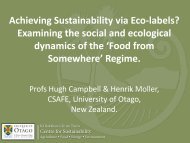Book of Abstract (incl. addendum) - IFSA symposium 2012
Book of Abstract (incl. addendum) - IFSA symposium 2012
Book of Abstract (incl. addendum) - IFSA symposium 2012
You also want an ePaper? Increase the reach of your titles
YUMPU automatically turns print PDFs into web optimized ePapers that Google loves.
Workshop 1.3 Understanding agricultural structural changes and their impacts, to support<br />
<strong>incl</strong>usive policy dialogue and formulation<br />
<strong>of</strong> smallholders into the global economy, but the broader agricultural transformations and structural<br />
change.<br />
The emergence <strong>of</strong> “firm” agriculture in France: Characteristics and<br />
coexistence with family farms?<br />
G. Nguyen and F. Purseigle<br />
University <strong>of</strong> Toulouse, France<br />
Nguyen@ensat.fr<br />
Up to now, French agricultural production is mainly based on family farming systems. The Common<br />
Agricultural Policy (CAP), at its creation in the 1950s, set up indeed the development <strong>of</strong> family<br />
farming systems to achieve food self-sufficiency as a clear policy objective. Fifty years later, in year<br />
2000, the CAP reform promoted the concept <strong>of</strong> multifunctionality, with the aim to defend a certain<br />
model <strong>of</strong> agricultural development where the role <strong>of</strong> family farms was reinforced. Despite this<br />
apparently strong policy support, the model <strong>of</strong> family farming appears not to be universal nowadays.<br />
Field surveys <strong>of</strong> farming systems conducted within our “Agrifirm” research project in different regions<br />
<strong>of</strong> France, as well as in-depth interviews with stakeholders <strong>of</strong> the agricultural sector, report evidences<br />
<strong>of</strong> the emergence <strong>of</strong> new forms <strong>of</strong> agricultural production, which appear to be very different from the<br />
model <strong>of</strong> family farming. The main objectives <strong>of</strong> our communication are, first, to present an<br />
interdisciplinary conceptual framework we have elaborated in order to better characterize new forms <strong>of</strong><br />
social and economic organizations <strong>of</strong> agricultural production, and second, to present the preliminary<br />
results <strong>of</strong> our regional case studies. We focus on the study <strong>of</strong> the rice farming systems in the Camargue<br />
region, located in the South-East <strong>of</strong> France, where we have found very diverse forms <strong>of</strong> new<br />
organizations associated with “firm” agriculture (agricultural service-supply enterprises, corporate<br />
farms, “family capitalism” farms, etc.). A typology is presented based on several major organizational<br />
and functional criteria, such as a complex form <strong>of</strong> governance with multiple logics, a new relationship<br />
to markets and to resources, a new organisation <strong>of</strong> labour. Finally, we discuss the determinants <strong>of</strong> the<br />
emergence <strong>of</strong> these new forms and the dynamics <strong>of</strong> the coexistence <strong>of</strong> these new forms with the more<br />
traditional family farms. We draw the hypothesis that the colonisation history <strong>of</strong> the Camargue region,<br />
its natural and geographical characteristics and the agricultural policies are among the major<br />
determinants. Despite the fact that the Camargue presents some very specific characteristics, the<br />
pattern <strong>of</strong> farming systems observed there could be found in other regions <strong>of</strong> France. This last<br />
observation brings us to the second hypothesis that the emergence <strong>of</strong> “firm” agriculture is a more<br />
general phenomenon, associated with the transformation <strong>of</strong> French agriculture in the context <strong>of</strong><br />
globalization.<br />
Rural Transformation and Structural Change: insights from Developing<br />
Countries facing Globalization<br />
Sandrine Freguin-Gresh, Eric White and Bruno Losch<br />
CIRAD, South Africa<br />
Sandrine.Freguin@up.ac.za<br />
Agriculture has a key role in development and poverty reduction. But beyond its role in producing<br />
food, it should also generate activities, income, and employment to facilitate rural transformation and<br />
structural change. This is particularly the case for developing countries facing the challenges <strong>of</strong><br />
incipient economic transitions and quickly evolving demographic context characterized by growing<br />
cohorts <strong>of</strong> new labor market entrants. While a larger labor force <strong>of</strong>fers countries new opportunities for<br />
growth related to the “demographic dividend,” it also could pose socio-political risks if investments<br />
and public policies are inappropriate to support the processes underway.<br />
32











